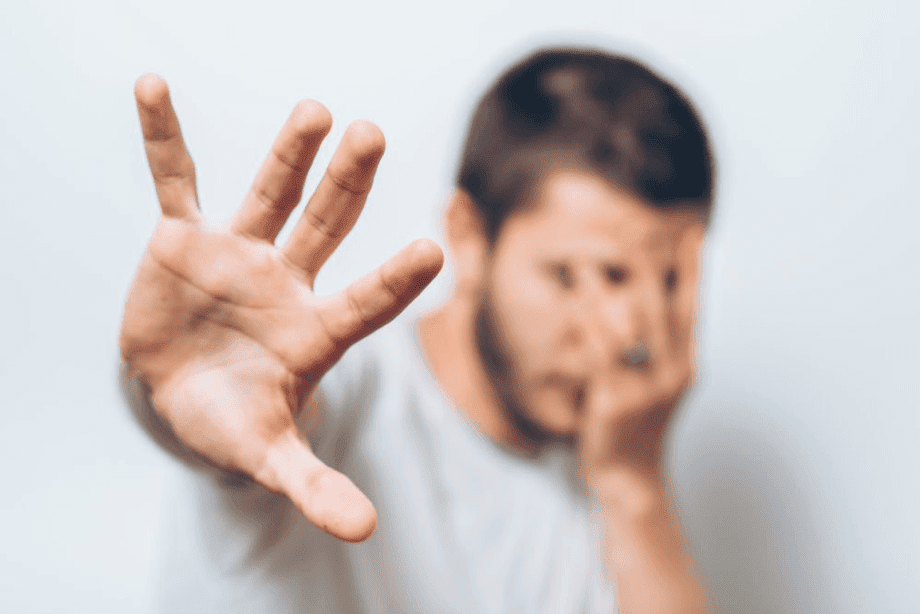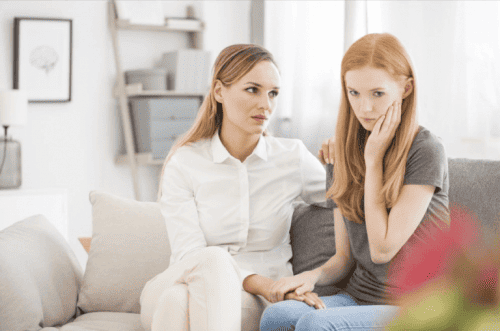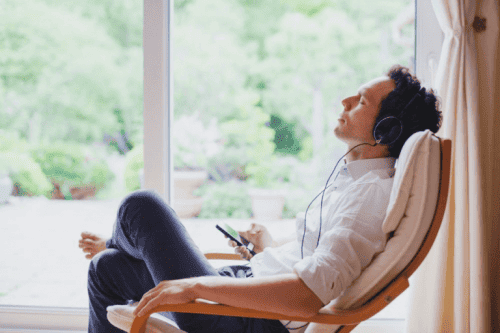Anxiety in some situations is normal as it triggers your flight or fight response to keep you safe from danger. This is normal and soon passes. But anxiety can be a problem when you become overly worried about things that may or may not ever happen. When your anxiety is out of proportion to the real threats to your life or invades all parts of your life, it may be out of control. This makes life difficult and can stop you from living a full life, and it makes you feel miserable.
When you feel anxious you may have negative or disturbing thoughts, feel scared and out of control. If you feel this way a lot of the time, you may have an anxiety disorder. Is anxiety is taking over your life?
What is Anxiety?
I have studied anxiety for 13 years. It is what causes anxiety that is important rather than its effect. The mechanics of anxiety are created during childhood. This does not mean you had a bad childhood. All sorts of things can cause anxiety. Things such as your school environment, the first time you left your mother or had a babysitter, or a time where you felt vulnerable. Anxiety has its roots in childhood fears, childhood insecurities and childhood vulnerabilities. These cause childhood fears and feelings of being unsafe which links to low self-esteem as you become an adult.
Most traditional therapies treat the effect rather than the cause of anxiety so most people do not recover from their anxiety as they do not build up their self-esteem.
So, what is self-esteem? Lack of self-esteem is when you do not feel worthy. When you feel insignificant, inferior, inadequate and that nobody loves you. You may also feel you are not good enough; and ugly and fat. People suffering low self-esteem are emotionally sensitive and take everything personally. When you have low self-esteem, your brain constantly triggers to stressful situations.
Perceptional fear
The only normal anxiety is when your life is threatened. Constant anxiety is the brain under perceptional fear. Perceptional fear dates back to your genetic history as your brain accesses up to seven generations of memory. Anxiety is so hard to treat because you become anxious whenever your brain feels unsafe.
Someone might not have anxiety but some situations make them feel anxious. For me, I don’t normally feel anxious. When I face public speaking, I feel anxious as my brain feels unsafe from the moment I step on stage. Once I start speaking and relax, my brain realises I am safe and the anxiety disappears. This is perceptional fear.
When the brain is in perceptional fear, it catastrophises every stress response that causes your fear-based reality. Fear, for some people, is driving down the freeway and are afraid of being in an accident even though the likelihood is very low. Your perceptional fear catastrophises the event even though it may never happen. Your brain thinks, “What if something happens to us and we do not survive?”
Perceptional fear is the genetic response and your brain creates patterns based on your responses.
Look at Donald Trump. He has the self-esteem and confidence of superman. People can shoot verbal bullets at him without any effect. He can say something that to the average person is outrageous but he feels totally safe in what he says and does. Trump is confident and has high self-esteem. You just have to look at the success he has in the material world. He has a brain that is completely tolerant to stress.
Anxiety only raises its ugly head when the brain feels unsafe. And the brain only feels unsafe when it is in survival patterns of behaviour. So, anxiety is linked to stress responses which produces high levels of cortisol and adrenaline. These are your stress hormones.
The hardest thing about treating anxiety is lowering the cortisol levels. You can naturally drop anxiety levels by dropping your cortisol levels. You can do this by changing how you perceive your fears and spend time developing your self-esteem. This will help you be more resilient to daily challenges, and stop you from being so emotionally sensitive and taking things personally.
Anxiety manifests differently for everyone. What makes me anxious may not make you feel anxious. So, you have to break the pattern of catastrophising life by removing environmental triggers. How do you do that? By changing your belief systems around who you are and what you do.
Common signs anxiety controls your life
Do you adopt an extremely cautious approach to your daily life? Are you constantly on alert for situations that may harm you or be dangerous? Does anxiety hold you back from doing the things you want to do? Are you afraid of trying something new or of social situations?
There are many different types of anxiety, but there are common signs anxiety controls your life. You can:
- worry about everything and feel fear all the time
- panic when faced with new situations
- think you are going mad
- feel detached from your body and life
- become nauseous when scared and nervous.
It does not have to be this way. You can take back control by taking action.
Take action
No matter how much you read about busting your anxiety, it will not help you unless you take action. Make a commitment to throw anxiety out of your life. Here are some things you can do to overcome your anxiety.
Mindful meditation
Download my free Mindfulness audio program and meditate. Mindful meditation is a great way to focus your mind in the present. It shifts your focus from the past or the future to the here and now. It helps you to focus on what you can control.
Regular mindfulness meditation is good for your mental, emotional and physical health, and helps you feel happier. Meditating also assists in reducing activity in the amygdala. This is the area of your brain responsible for activating your stress responses, and it may also reduce production of the stress hormone ‘cortisol’. It increases the production of serotonin, a neurotransmitter (or a ‘chemical messenger’) that plays a key role in happiness. Serotonin assists in regulating moods, boosts cognitive function, regulates appetite and assists in proper digestion, and also helps you to get a good night’s sleep.
Practice deep breathing
Practice deep breathing next time anxiety starts to take control. It is easy to do anytime, anywhere. Here is what to do:
- Get comfortable in a quiet location and close your eyes. Focus your attention on breathing naturally through your nose. Take notice of your breath as you breathe in and out.
- Take a deep breath while counting to four. Hold it for a count of four and then breathe out slowly to a count of four.
- As you breathe, empty your mind of any racing thoughts. Focus on your breathing. If your mind wanders, return it immediately to the sensation of your breathing.
- Repeat this as often as it takes to settle your mind so you forget about being anxious.
Make this a daily habit so you feel relaxed rather than anxious. This helps you focus on the present rather than worrying about what may happen or reliving the past.
Feel gratitude
Feeling gratitude for all you have is vital to being happy. Life is tough but there is always someone else worse off than you. Just look at social media or newspaper headlines to see this. You can make life a little easier by focusing on being grateful for all you have.
Write down what you are grateful for and add to it daily. When you focus on gratitude it is hard to be negative. It also helps you to attract the positive things you want in your life. And, remember, everything you feel is temporary no matter how positive or negative.
Exercise regularly
Exercising regularly has a positive effect on anxiety. Next time you feel anxious do something as simple as going for a walk. It is difficult to feel anxiety when you are exercising. Regular exercise:
- enhances your mood as it releases feel-good endorphins
- releases pent-up physical tension
- gives a natural boost of energy
- distracts from your worries and concerns
- boosts self-confidence and builds resilience
- enhances your ability to focus on the present moment
- encourages positive social interaction
- promotes quality sleep
- helps alleviate symptoms of associated conditions like depression
- promotes overall good health.
Declutter your house
How often do you lose your keys? How much time do you spend looking for something you know you have but cannot find? And, as you desperately look for these things your anxiety rises.
If this is you, it is time to declutter your house. Get rid of all the stuff you do not need in your life. Do it a bit at a time. It is easy and quick to do:
- Choose a drawer or cupboard to start with.
- Take everything out and organise it into four piles:
- Things you want to keep.
- Things to donate.
- Items to throw away.
- Things you no longer use but can sell.
Hold a garage sale or sell unwanted items on eBay. Use the extra money to pamper yourself.
Pamper yourself
When you feel good, you feel confident. Get a massage, a haircut or a manicure. It helps you feel better about yourself. It need not cost much if money is tight. Pamper yourself every now and then. You deserve to feel good about yourself.
Go out and socialise
When anxiety has its grip on you it is easy to say no to social situations. But it is important to stay connected with friends and family. Go out. Socialise with people you trust. It will make you feel better and give you a different perspective on life.
Go somewhere new
Put aside your fear of what could happen and go somewhere new. Make an effort to visit somewhere you have never been before. Go to the zoo, the Botanical Gardens or that new coffee shop and watch the word go by. Spending a few hours out of your comfort zone will help you see your fears are unfounded.
What you feel is not necessarily true
Know that when you feel guilty, ashamed and worthless that it is not accurate. When your self-talk is negative it causes anxiety and negative feelings. While this type of thinking comes naturally and is deeply rooted in your unconscious, you can change your negative self-talk. Challenge your negative thoughts to turn them around.
Challenge your negative self-talk
When your thoughts are negative so are your feelings. Pay attention to your self-talk. Negative self-talk will make you anxious. How often do you tell yourself:
- you are worthless
- that you will only fail if you try
- nobody cares about what you do
- I can’t?
Make the effort to challenge negative thoughts:
- Write them down as they occur.
- Write down how each one makes you feel using only one-word answers. Angry, frustrated, defeated, unloved, worthless which makes you anxious.
- Challenge your version of the truth. Is there any proof you are worthless? Have you failed at work? What proof do you have that the worst will come true? Has it in the past? Is it necessary to get angry at the kids when they do not clean their rooms?
When you commit to recording your negative thoughts and feelings every day and challenge them, you will see there is no reason to feel anxious. You are the one who creates your negative self-talk. So, you can change this by taking notice of negative thoughts and asking yourself for proof they are true.
Get help
Download my free ebook Stop the crippling effects of anxiety from controlling your life for more anxiety busting tips.
If none of this helps, contact us to find out how I can help you control your anxiety. It does not matter where you are in the world. We can work with you in our Spas, over the phone or via Skype. Book in today for my Emotional Empowerment Program. I have an introductory offer for just $79 so you can start taking back control of your life. We can help you replace anxiety with peace and happiness. Start today.





